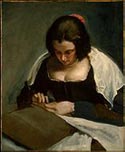N
Nabob'
162, 415, 418; Wealthy gentleman, who usually made his fortune in India.
Nádasdy Hussars
535; Hungary's oldest and most prestigious Hussar (light mounted) regiment, which was founded in 1688 and disbanded in 1920. Ferenc Count Nádasdy, member of an ancient aristocratic family of distinguished soldiers, became the owner in 1741.
Naming
286; 323
Napier, John (1550-1617)
John Napier of Merchistoun (1550 – 4 April 1617), nicknamed Marvellous Merchistoun, was a Scottish mathematician, physicist, astronomer/astrologer and 8th Laird of Merchistoun. He is most remembered as the inventor of logarithms and Napier's bones, and for popularizing the use of the decimal point. Napier's Bones were used for mechanically multiplying, dividing, and taking square roots. The rods (made of ivory, thus "bones") had numbers marked on them that solved mathematical problems when they were placed next to each other. Wikipedia entry
Nautch Girls
148; professional dancing girls in India; Nautch-Dancer with a Ruby in her navel,
177
Nawabheit
161; "Nawab" is an alternate spelling of "Nabob" (a man of great wealth); "heit" is a German suffix meaning quality of or a state of (-ness)
Nazareth
306
Neat's Tongue Pie
446; ox tongue pie
Needles
175; on St. Helena
483; "beautiful Needlewoman in an old Painting"; "The Needlewoman" by Spaniard Diego Velázquez (1599-1660)
Nemacolin
641; city in southwestern Pennsylvania
Neptune
21; Roman god of the sea, corresponding to the Greek god Poseidon, depicted as
an elderly man holding a trident and sometimes astride a dolphin or horse; 26;
56
Nervus Probandi
73; Latin: nervus = sinew, tendon, probandi = of proof
Nessel, Dr.
95; German engineer who builds Orreries and created a model of the new planet,
Georgian (aka Uranus)
net
356; Southern German: "no?" or "not so?" (Badisch question tag)
Nevilles and Vanes
416; paintings of in Raby Castle
Newark
436; town in Delaware near New Castle, about 3 miles south of
the Visto and 3 miles east of the Tangent Line
New Castle
258; North England city on the Tyne River; History - WARNING: music!
Newcastle Gang
200; 209
From Time, the Moon, and Calendars:
- In 1752, when the American colonies switched calendars from Julian to Gregorian, Ben Franklin wrote: "It is pleasant for an old man to be able to go to bed on September 2, and not have to get up until September 14."
558; the adoption of the Gregorian calendar (with its dropped 11 days) by England and Scotland in 1752; the correction was originally introduced by Pope Gregory XIII in 1582 and soon adopted by most Catholic countries; Protestant countries didn't adopt the "new style" until much later; 562; 603; See also Eleven Missing Days
Newton, Sir Isaac (1642-1727)
97; English scientist & mathematician, credited (along with Leibniz) with
developing the Calculus; 98; 116; cause and effect, 133; 138; 162; 169; 220;
227; 318; 319; 375; 603; 615; 763; 772; Online Resource
Nineveh
600; Ninevah, like Babylon, is a city frowned upon by the Judeo-Christians. When the city was degenerating into wickedness in the eyes of YHWH, he asked Jonah to go straighten them out. Instead Jonah fled by
sea, and ended up in the belly of a whale. The city was spared when the
regurgitated Jonah became a willing prophet unto them, which pissed off
Jonah who thought God was too lenient on them after all Jonah had
been through.
Nonius
707
Norfolk
396; city on the southeast tip of Virginia, near where the James River meets Chesapeake Bay
Nutation
437; oscillatory movement of the axis of a rotating body
Nynauld, Jean de
